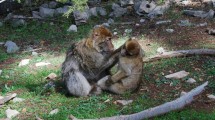Abstract
Data on the social changes that occurred after the release of 12 additional stumptails into a free-ranging group are reported here.
In spite of the fact that the members of the two groups had known each other for years, that genealogical relatives were re-united and that there were no limitations exerted by spatial conditions and social density, the release produced dramatic increments in aggressive and other social interactions. The resident group's alpha male was killed by two newcomer males, a restructuring of the dominance order took place, and the adult females were found to be important individuals in the re-establishment of stability.
Comparisons with group formation and re-introduction experiments conducted in captive rhesus and pigtail macaques were carried out.
Similar content being viewed by others
References
Altmann, J., 1974. Observational study of behavior: Sampling methods.Behaviour, 49: 227–285.
Bertrand, M., 1969.The Behavioral Repertoire of the Stumptail Macaque. Bibliotheca Primatologica, No. 11, S. Karger, Basel.
Bernstein, I. S., 1964. The role of dominant male rhesus in response to external challenges to the group.J. Comp. Physiol. Psychol., 57: 404–406.
————, 1974a. Aggression and social controls in rhesus monkey (Macaca mulatta) groups revealed in group formation studies.Folia primat., 21: 81–107.
----, ----Bernstein, I. S., T. P. Gordon, & ----R. M. Rose, 1974b. Factors influencing the expression of aggression during introductions to rhesus monkey groups. In:Primate Aggression, Territoriality and Xenophobia,R. L. Holloway (ed.), Academic Press, New York, pp. 221–240.
Bramblett, C. A., 1976.Patterns of Primate Behavior. Mayfield Publ. Co., Palo Alto, Calif.
Estrada, A., 1977a. A ten-month field study of the ontogeny of social relation in a free-ranging troop of stumptail macaques (Macaca arctoides). Ph. D. Thesis, Rutgers University, N. J.
----, 1977b. Behavioral synchrony in a free-ranging troop of stumptail macaques (Macaca arctoides): Relations to the ecology III. In prep.
————, 1976a. Birth and breeding cyclicity in an outdoor living stumptail macaque (Macaca arctoides) group.Primates, 17: 225–231.
----Estrada, A. & ----R. Estrada, 1976b. Establishment of a free-ranging colony of stumptail macaques (Macaca arctoides): Relations to the ecology I.Primates, 17: 337–355.
----Estrada, A. & ----R. Estrada, 1977. Patterns of predation in a free-ranging troop of stumptail macaques (Macaca arctoides): Relations to the ecology II.Primates, 18: 633–646.
----Estrada, A., R. Estrada, & ----F. Ervin, 1977. Establishment of a free-ranging colony of stumptail macaques (Macaca arctoides): Social relations I.Primates, 18: 647–676.
————, 1977. Social relations in a free-ranging troop of stumptail macaques (Macaca arctoides): Male-care behavior I.Primates, 18: 793–813.
Gouzoules, H., 1975. Maternal rank and early social interaction of infant stumptail macaques,Macaca arctoides.Primates, 16: 405–418.
Hagen, S., 1974. Stumptail troop shows high regard for motherhood.Primate Record, 5: 3–7.
Mason, W., 1965. The social development of monkeys and apes. In:Primate Behavior: Field Studies of Monkeys and Apes,I. DeVore (ed.), Holt, Rinehart, & Winston, Inc., New York, pp. 514–543.
Nagel, U. &H. Kummer, 1974. Variation in Cercopithecoid aggressive behavior. In:Primate Aggression, Territoriality and Xenophobia,R. L. Holloway (ed.), Academic Press, New York, pp. 15–184.
Rhine, R. J., 1972. Changes in social structure of two groups of stumptail macaques (Macaca arctoides).Primates, 13: 181–194.
————, 1973. Variation and consistency in the social behavior of two groups of stumptail macaques (Macaca arctoides).Primates, 14: 21–35.
Sade, D. S., 1968. Inhibition of son-mother mating among free-ranging rhesus monkeys.Sci. Psychoanal., 12: 18–37.
Southwick, C. H., M. F. Siddiqi, M. Y. Parooqi, &B. C. Pal, 1974. Xenophobia among free-ranging rhesus groups in India. In:Primate Aggression, Territoriality and Xenophobia,R. L. Holloway (ed.), Academic press, New York, pp. 185–209.
Vessey, S. H., 1971. Free-ranging rhesus monkeys: Behavioral effects of removal, separation and re-introduction of group members.Behaviour, 40: 216–227.
Weisbard, C. &R. W. Goy, 1976. Effects of parturition and group composition on competitive drinking order in stumptail macaques (Macaca arctoides).Folia primat., 25 (2–3): 95–121.
Welkowitz, J. R. B. Ewen &J. Cohen, 1971.Introductory Statistics for the Behavioral Sciences. Academic Press, New York.
Author information
Authors and Affiliations
Additional information
Research supported by grants from the Behavioral Science Foundation (U. S.), NSF No. GB-42235 and Behavioral Science Foundation.
About this article
Cite this article
Estrada, A., Estrada, R. Changes in social structure and interactions after the introduction of a second group in a free-ranging troop of stumptail macaques (Macaca arctoides): Social relations II. Primates 19, 665–680 (1978). https://doi.org/10.1007/BF02373634
Received:
Accepted:
Issue Date:
DOI: https://doi.org/10.1007/BF02373634




